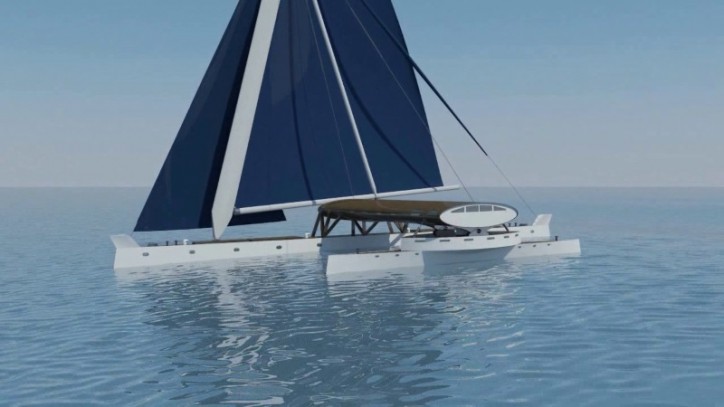On Tuesday, the designs for a multi access zero emissions cargo ship will be unveiled at the 5th Natural Propulsion Seminar in Wageningen, Netherlands.
The Fair Winds Trading Company (FWTC) is currently in the research and design stage for this state of the art zero-emissions, low impact sail cargo ship capable of transporting from remote low infrastructure points of production, i.e. micro ports, estuaries and beaches to points of purchase. Their designs are based on the ancient Prao; a multi hull cargo sailing ship of the South Pacific. They plan to initially transport goods between their sustainable development project in West Africa and Argyll, Scotland. Their long-term vision is to assist Small Island Developing States (SIDS), and coastal communities in the least developed countries in acquiring their own ships and establishing their own trade routes.

The recognition of the massive contributions of coastal wetland to greenhouse gas mitigation has lead to increased protection, regulation and oversight increasing the cost of establishing port facilities in those areas. FWTC’s PraoCargo ship will be able to access goods without adding to the negative impact of establishing ports in these fragile coastal regions.
“Our aim is, not only to achieve a zero negative impact method of sea transport, but also to demonstrate to commercial shipping and the market that this is not only do-able but desirable.” said Madadh MacLaine, founder and CEO of Fair Winds Trading Company
The team’s presentation will touch briefly on their work in the target area, from Gambia to Liberia, an area which has chronically suffered from low-level conflict, poverty and lack of access to world market. Then they will go into detail on how the vessel design specifically addresses this situation. What is a Prao? How does it differ from other ships? How has the team modified the design to incorporate modern technologies and specific requirements? i.e. SOLAS regulation, energy recuperation, etc.
The PraoCargo’s most significant design aspects are its load/size ratio, stability, and multi access capabilities. Due to its structure, the 60m long vessel has a shallow loaded draught of 4-6m depending on rudder position, minimum heeling and can maneuver under sail in shallow waters. She is designed with a maximum speed of 25knts, and an average speed of 13knts under sail, backed up with an electric motor drive system.
Alain Guillard, the naval architect and designer of the vessel has recently built a 12-meter model of the intended ship on which he is currently transporting gravel to test her functionality in the Gulf de Morbihan, France.
The Natural Propulsion Seminar, May 24, is held as part of BlueWeek, www.blueforum.org, which is an independent, dedicated and free event hosted by the Maritime Research Institute of the Netherlands (MARIN), where the industry, academics and institutions can come together to discuss the latest R&D initiatives, regulations and projects. The schedule also includes seminars on the challenges and innovative solutions for offshore wind and blue technology at sea.
Source: International Windship Association (IWSA)